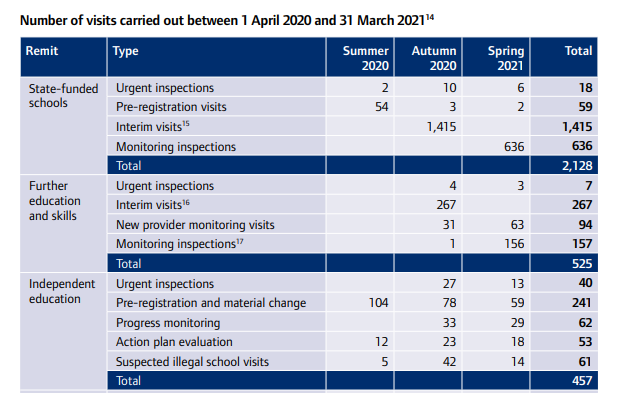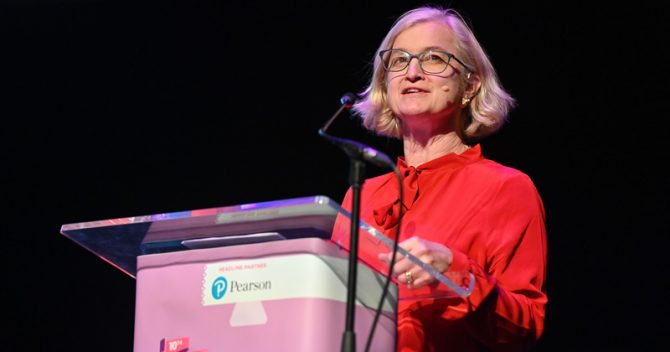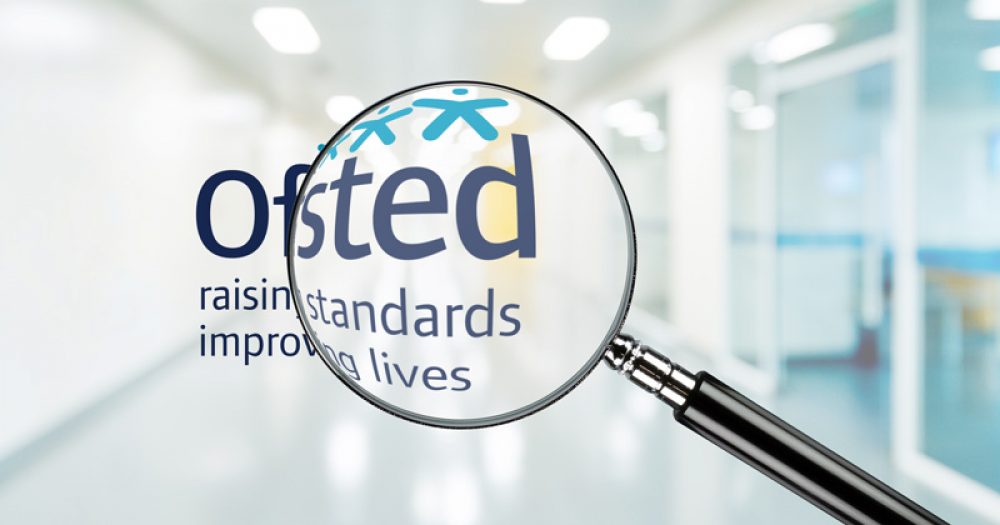Ofsted has published its corporate annual report and accounts, laying bare how the watchdog’s work has changed in an unprecedented year in which most of its functions were scaled back.
The document focuses on the inspectorate’s performance, and is not the same as the official annual report to Parliament each year, which focuses on inspection activity.
With routine graded inspections having been been suspended since March 2020, the report outlines how Ofsted adapted its approach throughout the year.
Here are eight interesting findings.
1. Ofsted conducted over 2,500 school ‘visits’
In total Ofsted conducted 2,128, mostly virtual “visits” to state-funded schools and 457 to independent education providers between April 2020 and March 2021.
In comparison, the inspectorate carried out 5,544 inspections of maintained schools, academies, special schools, and independent schools in 2018-19.

Of the visits to state schools, 1,415 were “interim visits”, while 636 were monitoring inspections.
As Ofsted has warned before, the report acknowledges that inspecting remotely “provides less assurance, and that we cannot provide adequate assurance remotely about safeguarding”.
2. Independent schools more likely to get ‘urgent’ inspections
Between April 1, 2020 and March 31, 2021, Ofsted carried out 40 urgent inspections of independent education providers.
Urgent inspections are conducted when the watchdog has concerns about leadership and management or safeguarding.
In contrast, 18 were conducted at state-funded schools.
Ofsted also carried out 61 visits to independent education providers suspected of running an illegal school.
3. Almost 800 staff redeployed during pandemic
Nearly 800 members of staff, around a third of Ofsted’s workforce, were deployed in 2020-21 due to the pandemic.
The report reveals 772 staff took on roles elsewhere as the suspension of inspections provided extra capacity.
Potential conflicts of interest were flagged prior to deployment, with mitigations introduced if necessary.
Some staff were deployed to other government departments such as the Department for Work and Pensions, the Department of Health and Social Care, the DfE and the Cabinet Office.
While others were deployed to over 100 local authorities, as well as to multi-academy trusts, children’s homes and the NHS.
These staff helped to track and support vulnerable children, advise schools and develop safeguarding processes.
4. Complaints down 92%
Ofsted received just 67 complaints this year compared with 890 in 2019-20 – a drop of around 92 per cent.
As most complaints come from recently inspected providers, Ofsted stated it was “not surprising that we have seen a significant reduction in complaints”.
More than half of the complaints were from early years providers and were about registration and other regulatory activity that continued through the pandemic.

5. But 1 in 4 complaints upheld (with 5 inspections ‘incomplete’)
During 2020-21, Ofsted closed 320 complaints.
Closed complaints include all cases where a response was sent in 2020-21, regardless of when the complaint was received.
Of those closed, 26 per cent “had an aspect upheld or partially upheld”.
The report states: “When a complaint is upheld, we take prompt action to put things right”.
The overall effectiveness judgement was changed for three inspections while Ofsted also deemed five inspections to be incomplete.
This led to inspectors carrying out a further visit to gather additional evidence.
6. Feedback to visits ‘overwhelmingly positive’
Providers who received an interim or assurance visit in the autumn and spring term were given a survey following the visit.
Chief inspector Amanda Spielman said the surveys were “overwhelmingly positive with providers saying that the visit will help them to improve”.
During the autumn, 75 per cent of 588 state-funded schools either strongly agreed or agreed the visit helped them to reflect on current plans and move forward.
During the spring, 96 per cent of 355 state-funded schools answered the same way.

7. Spielman warns of ‘exceptional challenge’ ahead
In her foreword to the report, Spielman said she was “delighted” to be reappointed for a further two years.
But she said she could see the “exceptional challenge ahead for all in education and children’s social care as we work together to bring children’s lives back to normality and make up for the extreme disruption most have suffered”.
“I and my team at Ofsted are committed to playing our full part.”
8. Senior staff waive bonuses due to Covid
None of Ofsted’s executive board members received bonuses in the 2020-21 year.
The report states: “Given the pandemic, senior managers agreed to waive any bonus that might otherwise have been paid (in line with wider Civil Service pay policy) in 2020–21 (and any end-of-year bonuses relating to the 2020–21 performance year that would have been paid in 2021–22).















Your thoughts